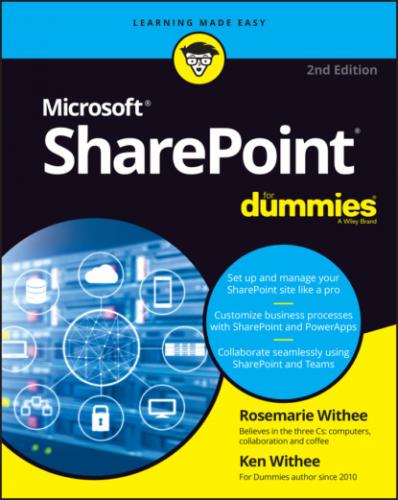Foolish Assumptions
Because SharePoint is such a huge topic, we have to make some assumptions about your configuration and starting knowledge, such as
You have access to some version of SharePoint Online or SharePoint Server. If you don’t have access to SharePoint, then sign up for SharePoint Online. After the free trial period, it costs as little as $5 a month. If you want to try to install SharePoint yourself for on-premises environments, a trial license is available for 30 days. Just download it from the Microsoft download center and get started.
You’re a contributor or administrator. Of course, many of the scenarios in this book require only that you be a contributor. So long as you know who your administrator is, you can ask that person for elevated permissions. And if you want to be master of your own SharePoint universe as an administrator, you can sign up for SharePoint Online and control all aspects of your SharePoint environment in a fairly intuitive interface.
Ideally, you have a sandbox or test environment where you can try different scenarios. It isn’t the best strategy to lock down security on your human resources site only to find out nobody in your entire organization can get to their pay stubs. You need a test environment or test site where you can play around with SharePoint, and then take that knowledge to your department site. Luckily, if you have access to SharePoint, you have your own personal site that you can explore. Another alternative is to use SharePoint Online. (Yes, you can buy a single license.)
Icons Used in This Book
A handful of icons are used in this book. Here’s what they mean:
Beyond the Book
In addition to what you’re reading right now, this product also comes with a free access-anywhere Cheat Sheet that describes some common SharePoint site templates, apps, and Web Parts, among other things. To get this Cheat Sheet, simply go to www.dummies.com and enter SharePoint For Dummies Cheat Sheet in the Search box.
Where to Go from Here
All right, you’re all set and ready to jump into the book. You can jump in anywhere you like — the book was written to allow you to do just that. But if you want to get the full story from the beginning, turn to Chapter 1 — that’s where all the action starts. (If you are already familiar with SharePoint, you might want to flip ahead to Chapter 2, where you can get your hands dirty with creating a site and developing it to fit your needs.)
Part 1
Getting Started with SharePoint
IN THIS PART …
Get familiar with SharePoint as a product and platform. SharePoint is a complicated beast, and most people use only a smidgen of its functionality.
See how SharePoint Online has changed the game and what it means to use a cloud-based solution, and learn when you should use SharePoint Online or SharePoint On-Premises.
Figure out what it means to develop a SharePoint site and how SharePoint works at a fundamental level.
Get your head around the vastness of SharePoint by exploring some of its functionality at a high level.
Chapter 1
Getting to Know SharePoint
IN THIS CHAPTER
When we first heard about SharePoint, we just didn’t get it. What the heck was this thing called SharePoint? We knew it was a Microsoft product that was supposed to do lots of things, but we just couldn’t figure out exactly what it was or how to get started working with it.
Well, after years of working with SharePoint, we have finally figured a few things out. SharePoint is a web-based software platform that is definitely capable of doing lots of things — more than you could ever imagine. And therein lies the problem. If you ask ten people what SharePoint does, you’re very likely to get ten different answers. SharePoint has such a depth to it that it’s hard to get your head around it.
In this chapter, we help you see the SharePoint big picture. You discover how SharePoint works and gain understanding on exactly what the term SharePoint means. This chapter peels away the mystery and shows you SharePoint at a basic level. After all, you need to understand SharePoint at a basic level before you can dive into its advanced functionality.
Up and Running with SharePoint in Three Minutes Flat
It is human nature to learn things by exploring and it is no different with software. You could read a hundred books about SharePoint and still barely understand what exactly it is and what it does. Our thinking is that there is no better way to get to know SharePoint than to get up and running with it, clicking buttons to see what they do.
With SharePoint Online you can get up and running with a trial in minutes. SharePoint Online comes bundled with Microsoft 365. The easiest way to get started is to sign up for a free trial of Microsoft 365. Here’s how:
1 Open your favorite web browser and go to www.office.com.The Office home page appears, as shown in Figure 1-1.
2 Click the Get Office button.To get SharePoint, you will need a business plan subscription.
3 Click
